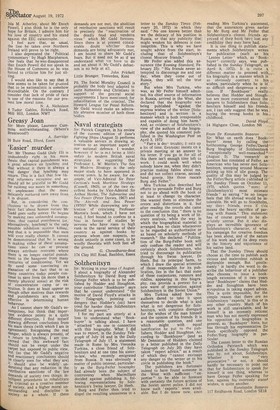'Easier' murder
Sir: Mr Thomas Gadd (July 15) is undoubtedly right in his main thesis: that capital punishment was a great advance on lynching and that without it there is always a real danger that lynching may return. This is a fact that few liberal reformers recognise and we Should all he grateful to Mr Gadd for rubbing Our noses in something SO unpleasant that the more delicately nurtured turn away from it in disgust. But, in considering t lw con to lw drawn from this basic fact about human nature Mr Gadd goes sadly astray. I le begins by making two unfounded assumptions that capital punishment (or. alternatively, lynching) is the only Possible inhibition against killing, and that it is impossible that men Will ever really change. It cannot he demonstrated that he is wrong in making either of these assumptions since he can at present always attribute restraint where there is no longer capital punishment to the hangover from many centuries of conditioning. Yet we do need some convincing exPlanation of the fact that in so Many countries today people continue to save lives (in more than a Merely physical sense) at the risk of concentration camp or execution. It does at least appear as though other motives than rewards and punishments are at times effective in determining human behaviour.
As I cannot share Mr Gadd's assumptions, but think that important evidence points in a quite different direction, I find myself drawing different conclusions from his Main thesis (with which I am in agreement). Recognising the real danger, which is always present, of a return to lynching, I am concerned that this awkward fact Should not be swept under the carpet but exposed to public view, but (so that Mr Gadd's negative arid reactionary conclusions should l?e clearly seen for what they are) It should also be widely understood that any reduction in the retributive sanctions of the law demands of society two things: in,t,elligent procedures to rehabilitate Lae criminal as a creative member ef society, and a higher moral understanding and discipline in society as a whole. If these demands are not met, the abolition of retributive sanctions will result in precisely the "reactivation of the deadly feud and vendetta virus" which Mr Gadd foresees. Since there is at present considerable doubt whether those demands are being adequately met, I am bound to share Mr Gadd's fears. But it need not be so if we understand what vie have to do and set about it. Mr Gadd's defeatism is no help at all.
John Prichett Little Brunger, Tenterden, Kent PS. The Social Morality Council is probably the body best adapted to unite humanists and Christians in support of the genr.:ral social requirements I have mentioned; for rehabilitation of the criminal, The Howard League for Penal Reform. Mr Gadd would make an admirably abrasive mcmber of both these bodies.
































 Previous page
Previous page